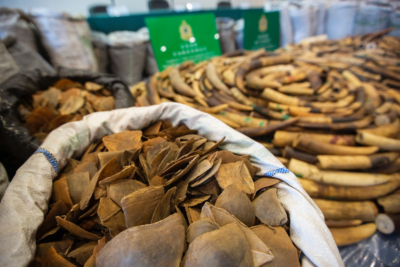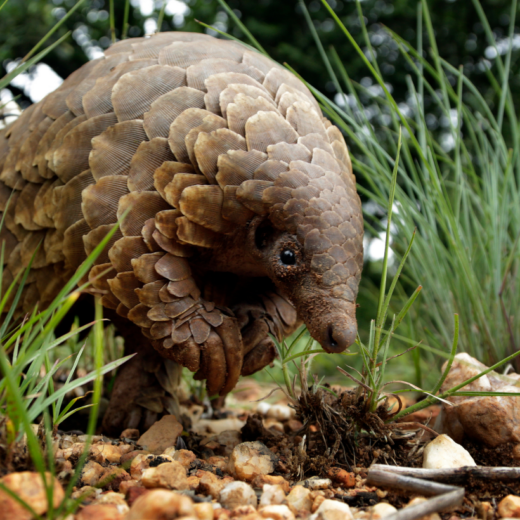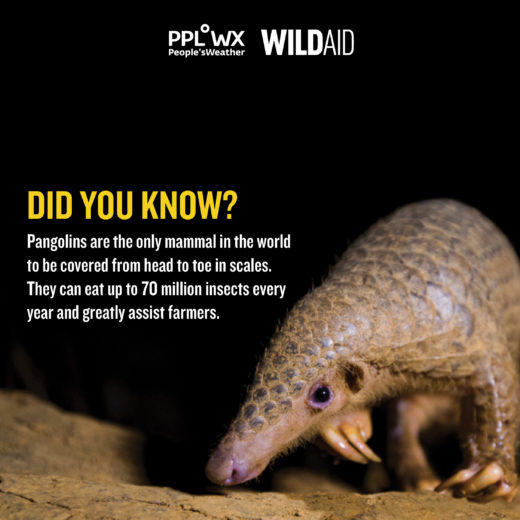
Reports of three major seizures of ivory and pangolin scales in two days highlight the ongoing urgency of wildlife poaching and illegal trade from Africa to Vietnam and China.
Since China’s President Xi announced a ban on domestic sales of ivory in 2017, ivory prices have dropped by more than two-thirds (from US$2,100/kg to less than $700/kg). Many other jurisdictions followed, including Vietnam, the UK, and the U.S. Seizures of ivory shipments into China fell by 80% as trade shifted to Vietnam and Laos. Poaching declined dramatically in Kenya and Tanzania.
As the price of ivory falls, smugglers appear to be turning increasingly to beleaguered pangolins, whose scales can still be legally sold when smuggled into China. New data from Hong Kong SAR – a major trafficking hub – shows a dramatic increase in pangolin seizures and a simultaneous decline in ivory seizures. Hong Kong SAR Customs seized 17.6 tonnes of pangolin scales in 2018, up from 7.9 tonnes in 2017. Meanwhile, the amount of ivory confiscated fell from 7,600 kg in 2017 to 370 kg in 2018.
Hong Kong SAR’s Customs and Excise Department recently reported it confiscated more than US$7.9 million worth of elephant tusks and pangolin scales from a shipping container that arrived from Africa on January 16th. With more than 8.3 tonnes of pangolin scales believed to have come from about 13,800 endangered pangolins and an estimated street value of US$5.4 million, it was the biggest seizure of pangolin scales, by value and weight, ever in Hong Kong SAR. The ivory shipment is the country’s third largest ever. The illegal products were en route to Hai Phong port in northern Vietnam.
In two recent, separate incidents reported in Vietnam and Uganda, additional shipments of ivory and pangolin scales were seized. Customs agents in the northern port city of Hai Phong discovered nearly 1.4 tonnes of pangolin scales and 20 elephant tusks weighing more than 100kg hidden inside a container from Nigeria registered as carrying timber. Ugandan authorities on Thursday reported seizing 750 pieces of ivory and thousands of pangolin scales being smuggled from neighboring South Sudan in one of the country’s largest seizures of illegal wildlife products. Two Vietnamese nationals are in custody over the contraband that had also been concealed inside pieces of timber carried by three freight containers.
These seizures, along with several others in recent months – including an August seizure of 27 rhino horn pieces, ~800 kg of worked and raw elephant ivory, and ~900 kg of pangolin scales in Angola, for which five Vietnamese nationals were arrested – show an alarming trend.
The border between China and Vietnam has been identified as a known smuggling route for contraband, including illegal wildlife products, for several years. In Vietnam, a newly instituted set of strengthened wildlife regulations carries a punishment of one to five years imprisonment and a fine between US$22,000 and $86,700 for illegal hunting, trading, poaching and transportation of even one pangolin. With the laws now in place, Vietnam’s authorities must utilize them with more effective arrests, prosecutions, and sentencing.
China implemented a domestic ban on ivory last year, and international trade in pangolin scales has been banned under the UN CITES treaty since 2017. Yet, persistent smuggling of ivory and pangolin scales into Vietnam and China highlights the ongoing poaching crisis and the importance of strengthening enforcement of these laws while also reducing consumer demand for these products.
“President Xi’s ivory ban turned the tide in the ivory wars,” said Peter Knights, CEO of WildAid. “Were China to end pangolin scale sales in the same way, China could help save African and Asian pangolins. Pangolins cannot be bred commercially and all populations are banned from trade so there is no possible legitimate source for ongoing scales sales.”
In China, medicinal sales of products containing pangolin scales are still allowed through designated hospitals. This is despite the lack of legal supply and in spite of over 100 available alternative treatments recognized in traditional medicine. Attempts at breeding pangolins in captivity have been very unsuccessful. The few dozen reportedly bred could in no way supply the 25-tonne-a-year consumption in recent years (representing tens of thousands of pangolins).
Traditional Chinese Medicine Should Stop Using Pangolin Scales
With wild supplies now illegal, the only possible source of scales could come from China’s own historic stockpile or from captive-bred pangolins. However, highly specialized live diets, their shy and solitary nocturnal nature, combined with weak immune systems and extreme sensitivity to capture-induced stress mean pangolins do not survive well in captivity, let alone successfully breed. Historically, facilities have recorded mortality rates of up to 70% in the first year, with the majority held having died within the first three years.
Pangolins produce one baby at a time. They have five months of gestation and three months of weaning and then the young pangolin will take several years to grow and reach maturity. Though husbandry has recently shown some signs of improvement, breeding on a commercial scale remains both unviable and unprofitable. There have been breeding efforts by zoos and breeding centers for a number of years. Information about these efforts has often not been made public, but it is clear that only a few dozen animals have been bred over a number of years, not the hundreds and thousands necessary for commercial use.
Therefore, facing the end of legal supply, traditional medicine must surely do what it has done throughout its entire history – change and adapt. In light of pangolins’ upgraded international level of protection and dwindling existing supplies of scales, it is becoming necessary that the TCM community find suitable, sustainable substitutes that maintain the tradition and efficacy of traditional medicine, but adapt to the changing environment. At a recent conference in Hong Kong SAR, TCM experts stated that there are over 100 viable alternatives to the uses of pangolin scales already prescribed in traditional medicines, demonstrating the flexibility of the practice.
Background
In 2016, WildAid launched a campaign to save pangolins by reducing consumption and eliminating demand for their meat and scales in China and Vietnam – the two largest consuming nations – through activities designed to change behavior by educating consumers and policy-makers, building awareness of the devastating poaching crisis, and strengthening enforcement efforts. Thanks to over $60 million in pro-bono media value for the campaign over the past two years, WildAid and its partners have exposed some 800 million viewers in China and Vietnam to pangolin campaign messages featuring mega-star martial arts hero Jackie Chan, popular actress and model Angelababy, singer and actor Jay Chou, and Miss Universe Vietnam Pham Huong, among others. The ads have been distributed across dozens of TV networks and shown on over 160,000 video screens in subways, airports, and bus stops.
Stay in touch and get the latest WildAid updates.
SIGN UP



